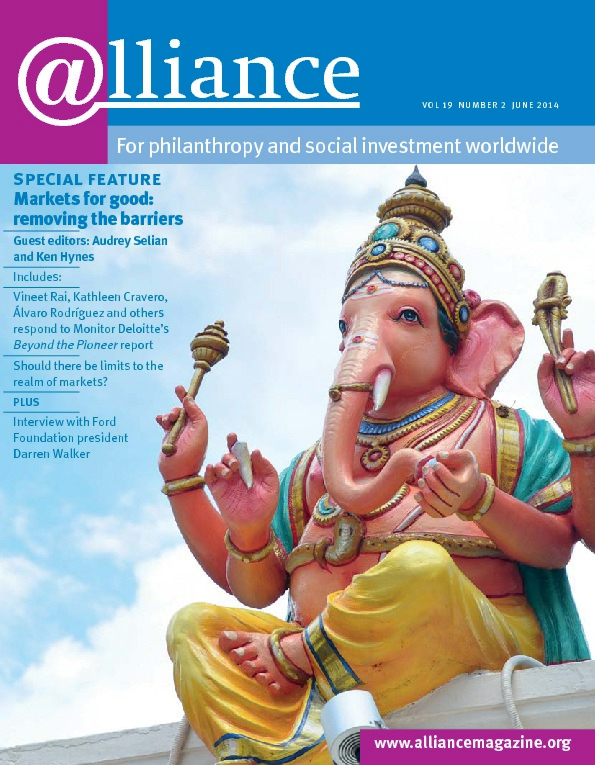In 1999, when the Michael & Susan Dell Foundation first opened its doors, we saw two ways to help steer partner organizations (mostly grantees) to sustainability and scale: we could help them attract a diversified set of funders (often other philanthropists) or we could help link them to government programmes, either as partners or as suppliers. But now a third path, pilot-tested with our microfinance programme over the course of several years, has opened up. This third path focuses on market-based solutions and impact investing.
Monitor Deloitte’s Beyond the Pioneer report identifies the main ecosystem-level barriers to scaling market-based solutions. For instance, for low-margin, bottom-of-pyramid-focused products, marketing spends may be unaffordable; and the resulting lack of awareness of the product can result in low adoption. We have seen this when monitoring formal micro-savings channels in India. They aren’t as popular as the age-old ‘savings under the mattress’ or community chit funds. Impact investments can play a valuable role here in helping to address distribution and demand challenges, bringing in a level of patience that traditional businesses cannot afford.
Interestingly, several funders (consciously or otherwise) are already playing the role of facilitator in this market, and funding projects to enable market shifts towards formal savings channels. This includes large-scale projects and knowledge sharing undertaken by CGAP and MicroSave, and the soft capital and innovation and challenge grants being made available by the Bill & Melinda Gates Foundation, Omidyar Networks and the Michael & Susan Dell Foundation.
As the report notes, to catalyse sustainable solutions at scale, impact investors in market-based models for BOP customers also need to take account of external factors: the demand for products, cultural beliefs and biases, aspirations and community trust.We also believe, as the report suggests, that addressing challenges that are internal to an organization, relating to management, staff, systems, processes, research and investment, while not simple, are relatively easier than addressing ecosystem-related issues. These external challenges require a structured and patient response. Accelerating the transformation of industry ecosystems and addressing broad-based market inconsistencies requires both a change of mindset by all stakeholders and a tangible policy push.
We believe that philanthropy and impact capital have enormous potential to create market shifts that allow for scale and long-term sustainability. Foundations have access to flexible capital and the funding tools to help push the market forward. The role of such foundations, including our own, is often prominent at all stages: in concept/product testing of early-stage impact projects, institution building, enabling ecosystems and resolving ecosystem barriers. Our early investments have allowed us to sit on the boards of urban microfinance investees, where we can directly influence norms and compliance – vitally important at the earliest stages of establishing new markets. By supporting industry standards for client protection, we ensure that our microcredit investees can conduct accurate credit checks to guard against over-indebtedness, and that they’ve established adequate internal procedures for client interactions. This requires long-term commitment and patience. Leveraging our direct experience with institutions, we are then able to work with other funders at the ecosystem level – as facilitators – to create standard metrics for social performance and the transparency of microfinance institutions across the world.
Foundations have the flexibility, and often the mandate, to measure success at a programme/sector level, rather than being driven by individual successes or failures. For the Michael & Susan Dell Foundation, for instance, our exit was tied to the share of urban microfinance in India increasing from less than 5 per cent in 2006 to over 30 per cent in 2012. While this approach allows us to play the roles of facilitator in addition to being a direct investor, defining targets, timelines and accountability can be difficult. Reliance on data, active project management, field presence and flexible funding tools has allowed us to mitigate some of these risks.
It is a common mistake to assume that having a solution is the same as solving a problem. We’ve learned over time that we have to do more than address people’s needs. While there are no easy solutions, we must remain in diligent pursuit of solving problems, and empowering change at every level.
Geeta Goel is Director, Mission Investing at the Michael & Susan Dell Foundation.




Comments (0)